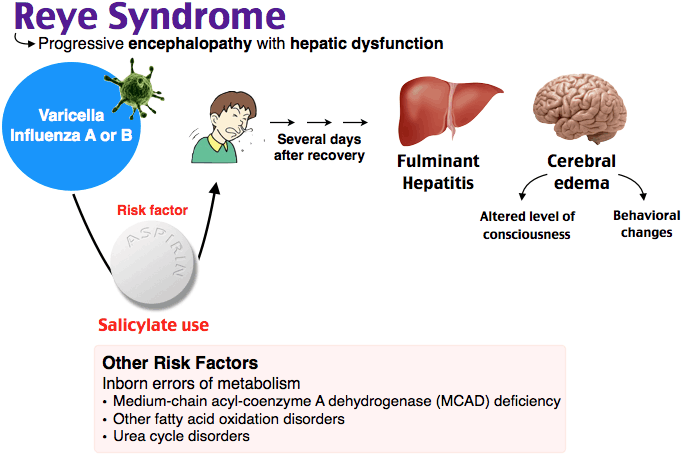The use of acetylsalicylic acid (ASA or Aspirin®) has been strongly linked to Reye Syndrome.
What is Reye Syndrome?

Reye Syndrome
is a rare disease that mainly affects children and teenagers when they have, or recently had, a viral infection such as chickenpox or influenza. Reye Syndrome causes swelling of the liver and brain, and it can also cause death.
How can I prevent Reye Syndrome?
The use of acetylsalicylic acid (ASA or Aspirin®) has been strongly linked to Reye Syndrome. Do not give ASA or Aspirin® to anyone under 18 years of age to manage symptoms such as fever, headache and muscle aches.
Instead, use acetaminophen for anyone under 18 years of age. Examples of medications with acetaminophen are Tylenol®, Tempra® and Atasol®.
You can also use ibuprofen for relief of symptoms in children under 18 years of age. Examples of ibuprofen include Advil® and Motrin®. Do not use products containing ibuprofen in children under 6 months of age without first talking to your health care provider.
Always use the dosage indicated in the product instructions or as recommended by your health care provider.
What are the symptoms of Reye Syndrome?
Symptoms of Reye Syndrome include:
- Unusual sleepiness or lack of energy
- Diarrhea and rapid breathing in infants and toddlers
- Persistent vomiting in children and teenagers
- Changes in personality or behaviour such as confusion, irritability or aggression. Reye Syndrome may also cause strange behavior such as staring and slurred speech
- Seizures and comas
- Loss of consciousness
Reye Syndrome occurs 3 to 7 days after the beginning of an infection or illness caused by a virus, or during recovery from the infection or illness. Reye Syndrome can be misdiagnosed as swelling of the brain, also known as encephalitis or swelling of the lining of the brain (meningitis), diabetes, drug overdose, poisoning, sudden infant death syndrome (SIDS) or a psychiatric illness.
What is the treatment?
Early diagnosis and treatment in a hospital can save your child’s life. Treatment includes reducing brain swelling, preventing damage to the liver and other organs and monitoring the heart.
Most people recover completely, but Reye Syndrome can cause permanent brain damage or death.
https://www.healthlinkbc.ca/healthlinkbc-files/reye-syndrome



